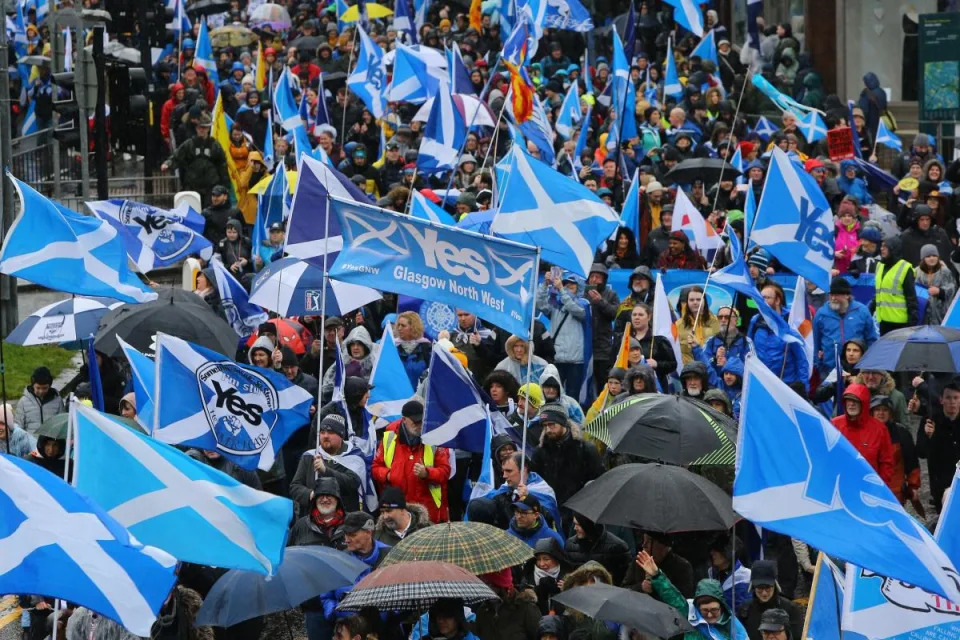Support for independence leads support for Union by four points, new report finds
Adam Robertson
Fri, 6 October 2023

New data has revealed that 45% of people would vote Yes in a Scottish independence referendum compared to 41% who would vote No
SUPPORT for Scottish independence leads support for the Union by four points, a new report from the Tony Blair institute has found.
When a total of 1004 respondents were asked how they would vote in a new independence referendum, 45% of respondents said they would vote Yes while 41% said they would vote No.
The report notes that “as other polls have found, neither side has established a significant and sustained lead”.
READ MORE: Rutherglen and Hamilton West by-election must be wake-up call for SNP
The report made a number of key findings about independence, specifically that 29% of people regard it as a priority while 14% say they want it but that there are more urgent issues to contend with.
Meanwhile, SNP voters are divided by 47% to 41% over the party leadership’s desire for the vote to be held as soon as possible.
“They would prefer to wait until victory seems likely.” the report notes.
“Figures suggest that even when Yes voters narrowly outnumber those who say No, only minorities back the SNP’s official view that independence is an urgent necessity as the party prepares for the next General Election.”
What about the next Westminster election?
Based on the report’s polling, the SNP would still return by far the largest contingent of Scottish MPs although its dominance would nonetheless be substantially reduced.
According to the figures, 37% of voters said they would vote SNP at the next election while 28% said they would vote Labour.
This would result in 34 seats for the SNP (down from the 48 won in 2019) and 13 for Labour (an increase of 11 on the two they currently have).
READ MORE: John Curtice: 'Uncertain' if Labour have 'sealed the deal' with electorate
The Tories meanwhile would stay the same with six MPs across Scotland.
However, the report did note that the SNP could face risks relating to “Unionist tactical voting” with figures showing that Labour “might gain two or three extra seats from the SNP”.
It comes after the Tories put their crushing loss in the Rutherglen and Hamilton West by-election, in which their candidate lost his deposit, down to tactical voting.
Record in government
When it came to the record of the Scottish Government, many voters were left “unimpressed”, according to the report.
Respondents were asked about a range of issues including:
Crime
Poverty
Schools
Housing
Drug abuse
Railways
NHS
The percentages of people who said the Scottish Government was doing “very well” on these issues did not rise above 7% (which they received for the NHS) while the lowest was 3% (which they scored for work tackling drug abuse).
The percentages of people saying the Scottish Government was doing “fairly well” or “neither well nor badly” on all these issues ranged from 16% to 27%.
However, the percentage scores for “very badly” on these issues ranged from 18% to 25%.
The report added: “These figures are by no means fatal to the SNP, given the significance of other issues and attitudes to Labour and the Conservatives.
“But they do suggest that SNP support might be vulnerable. If the SNP’s less committed supporters find other reasons for their loyalty to waver, the party might not have its record in tackling Scotland’s problems to fall back on.”
Approval ratings
The report found that First Minister Humza Yousaf (below) had a net approval rating of -15, the same as Labour leader Keir Starmer.

The National: Scotland’s First Minister Humza Yousaf will speak at the event in Edinburgh (Jane Barlow/PA)
Yousaf’s rival in the SNP leadership contest Kate Forbes had a net approval rating of -7 while Anas Sarwar sat at -9.
The report did not make good reading for Douglas Ross or Rishi Sunak who had ratings of -30 and -41 respectively.
EU relationship
The report also found that voters wanted a closer relationship with the EU. Statistics showed that 69% of SNP voters said they wanted to rejoin the EU, while 51% of Labour voters said the same.
By contrast, just 9% of Tory voters wanted to rejoin while only 26% said there should be a “closer relationship”.
SUPPORT for Scottish independence leads support for the Union by four points, a new report from the Tony Blair institute has found.
When a total of 1004 respondents were asked how they would vote in a new independence referendum, 45% of respondents said they would vote Yes while 41% said they would vote No.
The report notes that “as other polls have found, neither side has established a significant and sustained lead”.
READ MORE: Rutherglen and Hamilton West by-election must be wake-up call for SNP
The report made a number of key findings about independence, specifically that 29% of people regard it as a priority while 14% say they want it but that there are more urgent issues to contend with.
Meanwhile, SNP voters are divided by 47% to 41% over the party leadership’s desire for the vote to be held as soon as possible.
“They would prefer to wait until victory seems likely.” the report notes.
“Figures suggest that even when Yes voters narrowly outnumber those who say No, only minorities back the SNP’s official view that independence is an urgent necessity as the party prepares for the next General Election.”
What about the next Westminster election?
Based on the report’s polling, the SNP would still return by far the largest contingent of Scottish MPs although its dominance would nonetheless be substantially reduced.
According to the figures, 37% of voters said they would vote SNP at the next election while 28% said they would vote Labour.
This would result in 34 seats for the SNP (down from the 48 won in 2019) and 13 for Labour (an increase of 11 on the two they currently have).
READ MORE: John Curtice: 'Uncertain' if Labour have 'sealed the deal' with electorate
The Tories meanwhile would stay the same with six MPs across Scotland.
However, the report did note that the SNP could face risks relating to “Unionist tactical voting” with figures showing that Labour “might gain two or three extra seats from the SNP”.
It comes after the Tories put their crushing loss in the Rutherglen and Hamilton West by-election, in which their candidate lost his deposit, down to tactical voting.
Record in government
When it came to the record of the Scottish Government, many voters were left “unimpressed”, according to the report.
Respondents were asked about a range of issues including:
Crime
Poverty
Schools
Housing
Drug abuse
Railways
NHS
The percentages of people who said the Scottish Government was doing “very well” on these issues did not rise above 7% (which they received for the NHS) while the lowest was 3% (which they scored for work tackling drug abuse).
The percentages of people saying the Scottish Government was doing “fairly well” or “neither well nor badly” on all these issues ranged from 16% to 27%.
However, the percentage scores for “very badly” on these issues ranged from 18% to 25%.
The report added: “These figures are by no means fatal to the SNP, given the significance of other issues and attitudes to Labour and the Conservatives.
“But they do suggest that SNP support might be vulnerable. If the SNP’s less committed supporters find other reasons for their loyalty to waver, the party might not have its record in tackling Scotland’s problems to fall back on.”
Approval ratings
The report found that First Minister Humza Yousaf (below) had a net approval rating of -15, the same as Labour leader Keir Starmer.

The National: Scotland’s First Minister Humza Yousaf will speak at the event in Edinburgh (Jane Barlow/PA)
Yousaf’s rival in the SNP leadership contest Kate Forbes had a net approval rating of -7 while Anas Sarwar sat at -9.
The report did not make good reading for Douglas Ross or Rishi Sunak who had ratings of -30 and -41 respectively.
EU relationship
The report also found that voters wanted a closer relationship with the EU. Statistics showed that 69% of SNP voters said they wanted to rejoin the EU, while 51% of Labour voters said the same.
By contrast, just 9% of Tory voters wanted to rejoin while only 26% said there should be a “closer relationship”.
No comments:
Post a Comment